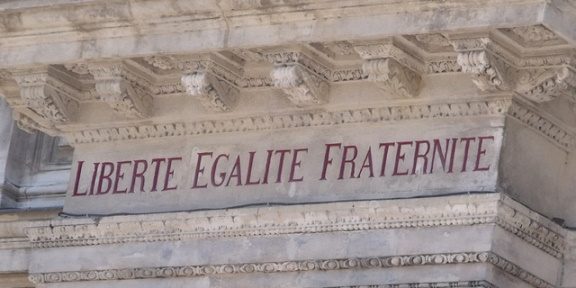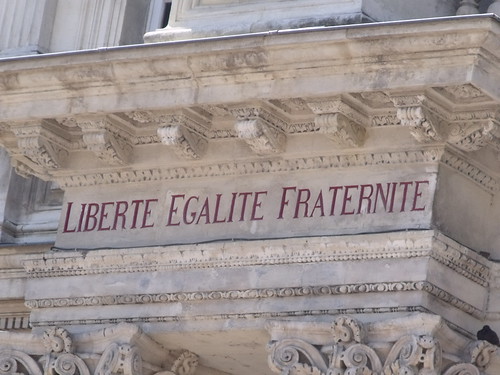This post was contributed by Daniele D’Alvia, MPhil Law student in Birkbeck’s School of Law. Here, Daniele shares his personal thoughts on the Leave result of the UK EU referendum.
I am European. I am Italian. The day after Brexit on the 24th of June 2016 I started to attend a law course in Paris at the Sorbonne School of Law as part of my Ph.D. research in London. As soon as I entered the main building three words attracted my attention. They are the words of the French Revolution: liberté, égalité, and fraternité. They are the words that on the 23rd of June 2016 when the UK population decided to leave Europe I felt as forgotten in my soul and in my heart.
I teach seminars in European Union Law since I have started my Ph.D. at Birkbeck University of London and I have always been taught by my Italian law Professors that the principle of integration in Europe does not translate and never will constitute a conflict between sovereignties. The limitation and the sharing of competences between the EU sphere and the national sphere is not a limitation. By contrast, it is an opportunity for growth. Europe is not just an idea. It is not just a motivation to fight for ideals. Europe is a pure sentiment of cohesion of ideals and motivations.
I say this because I have lived the European integration in 2013 when I decided to leave my own country and I started to study an LL.M. in London. The UK was an extremely welcoming country and London made my mind vivid again. After only seven months I won a Ph.D. and I became a Ronnie Warrington Scholar. I started to teach European Union Law and I was appointed as the module convenor for Comparative Law at Birkbeck. I saw the opportunity for growth that was called Europe. I have lived that opportunity and it is beautiful.
The French Revolution: 3 words to explain the European Revolution
Liberté, égalité, and fraternité these are the words that you can read on the front face of the building of the Sorbonne School of Law in Paris. In my view, these three simple words can clearly explain what Europe is about.
Firstly, liberté means freedom. During the French revolution freedom and the right to freedom was much more than a political idea of rebellion against the constituted power. Indeed, it was so important that it translates as the raison d’être of any other political and civil right that comes from a general conception of freedom. In the same fashion, the European Union has established four fundamental freedoms: free movement of goods, services, capitals and persons. These rights to freedom are the legal grounds for the establishment of any other civil or political rights within the Union (for instance, think to the right to non-discrimination not only as free movement of workers and security of the same job conditions, but specifically as free movement of goods in order to not discriminate against imported goods, or consumer protection).
Secondly, égalité means equality. It has a strong meaning, and it is the celebration of the humanity of law. In this light, the judge should be the bush de la loue, in other words he should speak for the law, not against the law. He has to interpret and apply the law for the ordinated coexistence of men. The law is above the judge. The European Union has always followed the same principle through the judicial review process of the European Court of Justice. Furthermore, think to the principle of supremacy of EU law over national legislation – can’t you see the glorification of law over domestic powers? It is a great harmonization of law for the first time, isn’t it? Again this is not a conflict between sovereignties. This is an opportunity for growth by virtue of the principle of integration.
Thirdly, fraternité is a motion to understand that all men are created equal. It is the French Déclaration Universelle des Droits de l’Homme et du Citoyen (1789). In Europe it is the European Convention of Human Rights (1950) and the Charter of Fundamental Rights of the European Union (2007). It means that the natural law is above positive law. In other words, the Charter of Fundamental Rights of the European Union has been approved in order to recognise the existence of a series of fundamental human rights that exist and are legitimised before the Law.
Three words
In the end, three words that derive from the French Revolution are capable of explaining the European idea of Union. This is the real Revolution. To think of Europe by virtue of three words is a Revolution itself that can explain much more to the reader than any complex view of European Union law as a pure technical exercise. It is for the first time a unique instance of a universal conception of law.

Daniele D’Alvia
For this, although I have seen Brexit in 2016, I am still in love for Europe. In particular, the challenge I would like to pose here – or better, provoke (I am Italian for this, we love to provoke) – is the following: if three words can explain Europe and, therefore, show that in front of the famous complexity and technocracy of Europe there is only a real opportunity for growth and unification, what does the word ‘Brexit’ alone mean? Can the significance of one word explain the significance of a decision to leave and reject all the universal meanings that only Europe is capable of conveying, and even before Europe the French Revolution?
I don’t think so. The dream of an “ever closer Union among the peoples of Europe” of the Treaty of Rome was not just a dream but is becoming and will soon become a reality despite Brexit.
Note: This post represents the views of the authors and not those of Birkbeck, University of London
Find out more


